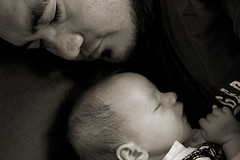
I recently came across an article from 2008 on the benefits of co-sleeping. I co-slept with both of my children. I always recommend it to new parents.
Cosleeping and Biological Imperatives: Why Human Babies Do Not and Should Not Sleep Alone
This article was written by By James J. McKenna Ph.D. and Edmund P. Joyce C.S.C. Chair in Anthropology
Director, Mother-Baby Behavioral Sleep Laboratory University of Notre Dame. They also wrote a book titled [amazon_link id=”1930775342″ target=”_blank” ]Sleeping with Your Baby: A Parent’s Guide to Cosleeping[/amazon_link]
There were many biological and psychological reasons for my choice to co-sleep. Of course it made breastfeeding easier at night. I felt more comfortable having my baby that close to me to monitor him/her all night.
Many parents worry about rolling over onto their baby. I had that same concern, but it quickly dissipated that first night. My babies snuggled close taking comfort in the heat of my body, and the rhythm of my heart and breath. I took similar comfort.
The authors of the above mentioned article are careful to articulate the difference between co-sleeping and more dangerous practices like falling asleep on the couch with your baby.
Unfortunately, the terms cosleeping, bedsharing and a well-known dangerous form of cosleeping, couch or sofa cosleeping, are mostly used interchangeably by medical authorities, even though these terms need to be kept separate. It is absolutely wrong to say, for example, that “cosleeping is dangerous” when roomsharing is a form of cosleeping and this form of cosleeping (as at least three epidemiological studies show) reduce an infant’s chances of dying by one half.
Bedsharing is another form of cosleeping which can be made either safe or unsafe, but it is not intrinsically one nor the other. Couch or sofa cosleeping is, however, intrinsically dangerous as babies can and do all too easily get pushed against the back of the couch by the adult, or flipped face down in the pillows, to suffocate.
Safe co-sleeping has great benefits, as found in studies done in other cultures where this is the norm.
Research
In Japan where co-sleeping and breastfeeding (in the absence of maternal smoking) is the cultural norm, rates of the sudden infant death syndrome are the lowest in the world. For breastfeeding mothers, bedsharing makes breastfeeding much easier to manage and practically doubles the amount of breastfeeding sessions while permitting both mothers and infants to spend more time asleep. The increased exposure to mother’s antibodies which comes with more frequent nighttime breastfeeding can potentially, per any given infant, reduce infant illness. And because co-sleeping in the form of bedsharing makes breastfeeding easier for mothers, it encourages them to breastfeed for a greater number of months, according to Dr. Helen Ball’s studies at the University of Durham, therein potentially reducing the mothers chances of breast cancer. Indeed, the benefits of cosleeping helps explain why simply telling parents never to sleep with baby is like suggesting that nobody should eat fats and sugars since excessive fats and sugars lead to obesity and/or death from heart disease, diabetes or cancer. Obviously, there’s a whole lot more to the story.
As regards bedsharing, an expanded version of its function and effects on the infant’s biology helps us to understand not only why the bedsharing debate refuses to go away, but why the overwhelming majority of parents in the United States (over 50% according to the most recent national survey) now sleep in bed for part or all of the night with their babies.
That the highest rates of bedsharing worldwide occur alongside the lowest rates of infant mortality, including Sudden Infant Death Syndrome (SIDS) rates, is a point worth returning to. It is an important beginning point for understanding the complexities involved in explaining why outcomes related to bedsharing (recall, one of many types of cosleeping) vary between being protective for some populations and dangerous for others. It suggests that whether or not babies should bedshare and what the outcome will be may depend on who is involved, under what condition it occurs, how it is practiced, and the quality of the relationship brought to the bed to share. This is not the answer some medical authorities are looking for, but it certainly resonates with parents, and it is substantiated by scores of studies.
This is the first article I have read that helped me understand the biological imperatives of co-sleeping. I had never considered how the low calorie make up of breastmilk would require more frequent nighttime feeding.
The low calorie composition of human breast milk (exquisitely adjusted for the human infants’ undeveloped gut) requires frequent nighttime feeds, and, hence, helps explain how and why a cultural shift toward increased cosleeping behavior is underway. Approximately 73% of US mothers leave the hospital breast feeding and even amongst mothers who never intended to bedshare soon discover how much easier breast feeding is and how much more satisfied they feel with baby sleeping alongside often in their bed.
But it’s not just breastfeeding that promotes bedsharing. Infants usually have something to say about it too! And for some reason they remain unimpressed with declarations as to how dangerous sleeping next to mother can be. Instead, irrepressible (ancient) neurologically-based infant responses to maternal smells, movements and touch altogether reduce infant crying while positively regulating infant breathing, body temperature, absorption of calories, stress hormone levels, immune status, and oxygenation. In short, and as mentioned above, cosleeping (whether on the same surface or not) facilitates positive clinical changes including more infant sleep and seems to make, well, babies happy. In other words, unless practiced dangerously, sleeping next to mother is good for infants. The reason why it occurs is because… it is supposed to.
I encourage all parents to co-sleep, but I encourage you to do some research. Don’t just put baby in your bed and think it will be fine. Prepare the space. Read some books. Talk to other parents and midwives.
[amazon_enhanced asin=”1930775342″ /]